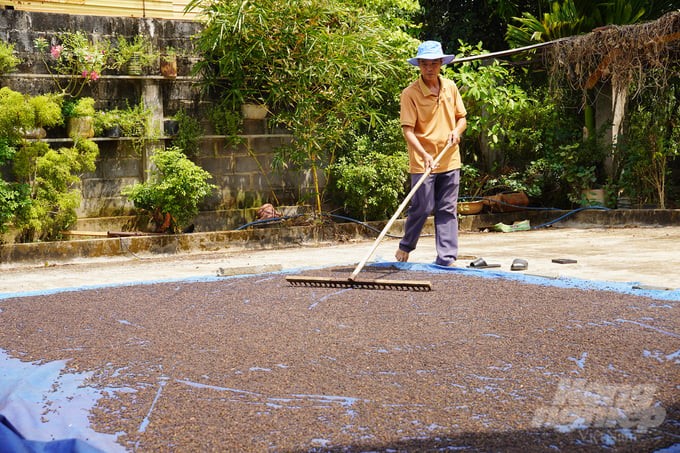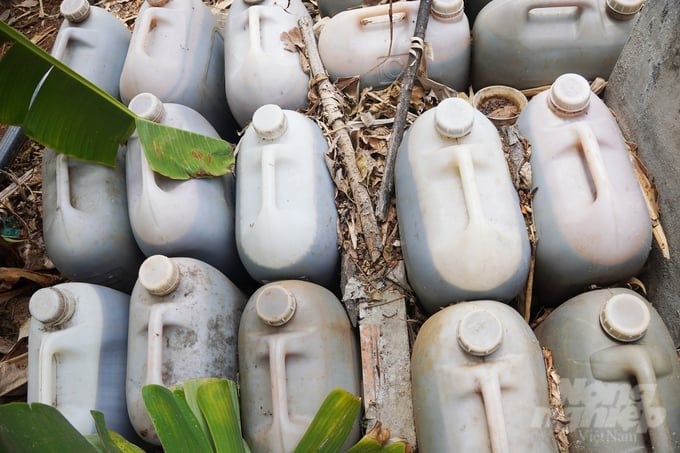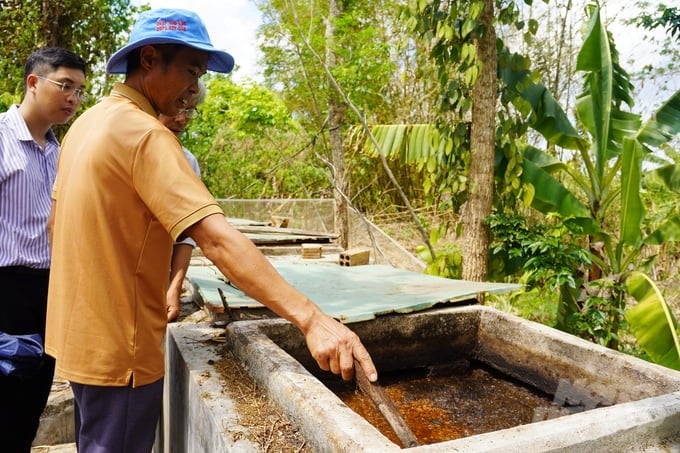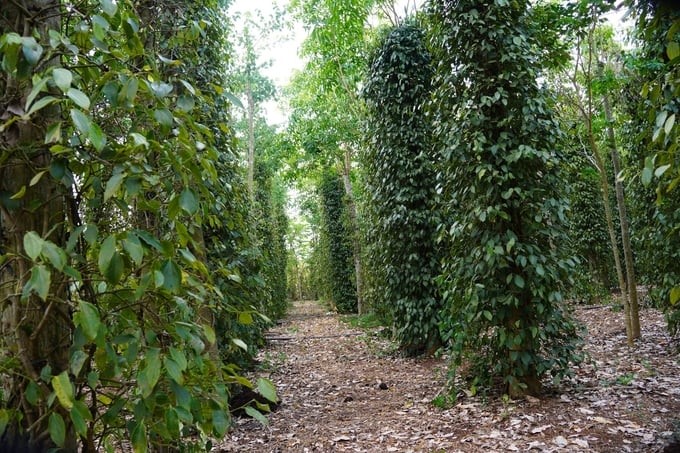November 27, 2025 | 07:25 GMT +7
November 27, 2025 | 07:25 GMT +7
Hotline: 0913.378.918
November 27, 2025 | 07:25 GMT +7
Hotline: 0913.378.918
From a particularly difficult commune with limited traffic, but with the local government's efforts and people's consensus, Lam San commune (Cam My district, Dong Nai province) has completely changed. The inter-village roads are concreted, people's income is getting better, and Lam San becomes a model new rural commune.

Many farmers in Lam San commune (Cam My district, Dong Nai province) persistently grow organic pepper. Photo: Nguyen Thuy.
Mr. Truong Dinh Ba, Chairman of Lam San Commune Farmers' Association, said that many years ago, pepper brought good income to local people, but recently, due to the impact of climate change, fertilizer costs increased and pepper prices decreased, causing many households to no longer be interested in pepper.
However, with the attention of leaders of Dong Nai province, districts, and communes, although the pepper growing area has decreased, pepper is still the staple crop of people in Lam San commune. In addition to the traditional pepper growing area, Lam San commune also encourages clean and organic pepper cultivation, meeting increasingly strict standards on quality, food safety and hygiene, no pesticide residue, etc.
Farmers here have created, researched, and learned good ways and models to care for crops and livestock to achieve productivity and quality, reduce costs, and adapt to climate change. Among these must especially be mentioned the households in Lam San Pepper Cooperative Group.
With local encouragement, Mr. Mai Dac Truong (hamlet 4, Lam San commune) began converting to organic pepper growing in 2019, with an area of approximately 4,000 m2, including 600 pepper pillars.
When converted, the pepper plant was not productive and infected with many pests, making Mr. Truong as well as many households worried. However, through training classes and guidance from the agricultural sector and the Commune Farmers' Association, Mr. Truong and members of the Lam San Pepper Cooperative Group have gradually grasped the technical and domestication processes of organic pepper plants.

Boxes of fish protein are composted from trash fish resources by farmers in Cam My commune to fertilize crops. Photo: Nguyen Thuy.
According to Mr. Truong, previously, when chemical fertilizers were used, pepper productivity was unstable. Since converting to organic farming, pepper plants have become more vigorous, with stable productivity and savings on fertilizer and pesticide costs. "My house is located near the pepper garden, so converting to organic farming helps me feel more secure, both ensuring plant health, being good for the environment, and ensuring the health of my family," he said.
As one of the pioneers in doing organic agriculture in Lam San, with an area of 2.2 hectares, Mr. Truong Dinh Ba intercrops many types of plants, of which 90% are pepper, which is completely cultivated according to organic methods without the use of any chemicals or pesticides.
One of the secrets for organic pepper to achieve productivity and reduce costs of Mr. Truong, Mr. Ba, and organic pepper growers in Lam San commune is to utilize trash fish resources in Song Ray lake bed to compost probiotics to make IMO products to fertilize crops.
"Previously, we had to spend money buying original yeast to compost fish protein, but now we are self-sufficient in indigenous probiotics with a quality that is not different from that of companies, but the price is low.
After a period of development, we have also launched many products for long-term storage and usage, such as dry probiotics and indigenous probiotics composted with chili, garlic, and ginger to make biological plant protection products to prevent and control pests on pepper plants as well as other crops," said Mr. Truong Dinh Ba.
According to Mr. Ba, every year he and some other households buy about 1.5 tons of trash fish, creating about 1,000–1,500 liters of fish protein to prepare for the next crop.

Trash fish is composted with probiotics to create IMO products, which are a source of organic fertilizer that brings high nutrition to crops. Photo: Nguyen Thuy.
Mr. Ba further explained: "Our organic agricultural production method is organic combined with circular agriculture, creating a circular ecosystem." In addition to growing pepper, Mr. Ba also raises about 100 chickens and ducks, and 20 goats. To make food for the goats, he takes advantage of cotton pillars (growing cotton trees for pepper plants to stick to them), then takes goat and chicken manure to raise earthworms, and the earthworm manure is used to fertilize pepper plants. It's all a cycle; nothing in the garden is left out.
"The most important thing when doing organic agriculture is will and persistence, without impatience. Once farmers understand the meaning and nature of organic farming, production will be easier. When farmers clearly understand the benefits that organic farming brings, they will like it and be willing to persistently implement it," said Mr. Truong Dinh Ba.
Mr. Truong also affirmed that, as Chairman of the Lam San Commune Farmers' Association, he and other members will regularly disseminate, encourage, and analyze so that people minimize the use of chemical fertilizers and pesticides on crops and increase the area of organic farming in the commune.
To help farmer households master organic farming techniques, Lam San Pepper Cooperative Group established an on-farm monitoring group. Thereby, experienced people can share with each other and cross-monitor to jointly make efforts towards achieving organic pepper certification and exporting to many markets around the world.

Organic farming helps the soil stay fertile and the pepper plants stay green and healthy. Photo: Nguyen Thuy.
However, for pioneers in small-scale organic farming to have high profits, serving as a basis to encourage households in the area to convert to the organic agricultural model, Mr. Ba assumes that the local government, cooperatives, and businesses need to pay more attention and have appropriate support policies and mechanisms. Thereby, helping farmers feel secure and persistent in farming; enhancing the brand and value of organic pepper; ensuring the products produced do not contain chemical residues; protecting the health of consumers and producers; as well as creating a healthy living environment.
Currently, Lam San commune has only about 1,100 hectares of pepper left, of which only about 16 hectares are converted to organic pepper production, which is still very low compared to the locality's existing potential.
Developing organic agricultural and high-tech agricultural production has been identified by Dong Nai province as one of the tasks that must create a breakthrough. In particular, Dong Nai determines to develop high-tech agriculture and organic agriculture associated with the processing industry and product consumption markets. Develop organic agricultural production with high added value, sustainability, and friendliness to the ecological environment, contributing to stabilizing life and increasing income for producers.
Translated by Thu Huyen

(VAN) Tay Ninh’s livestock sector is undergoing a major transformation, applying high-tech, closed-loop circular models to build sustainable value chains.
/2025/11/26/3627-4-082628_818.jpg)
(VAN) From a small café on the red basalt highlands, Le Van Hoang started a business with clean coffee, building Enjoi Coffee into a symbol of organic agriculture in the Lam Dong plateau.
/2025/11/25/0045-1-135246_13.jpg)
(VAN) Ca Mau is researching a model of sea-encroaching embankments combined with viaducts and logistics service zones, aiming both to prevent erosion and create land funds for marine economic development.

(VAN) The information was shared at the seminar 'Urban Agriculture - Solutions for Developing Green Spaces,' organized by the Kinh te & Do thi Newspaper and the Biotechnology Center of Ho Chi Minh City.
/2025/11/19/4141-2-132831_216.jpg)
(VAN) One of Japfa's outstanding solutions is implementing digital transformation and artificial intelligence (AI) to optimize operations, enhance productivity, and advance sustainable development.
/2025/11/19/4847-1-093540_448.jpg)
(VAN) The Gia Lai Provincial People’s Committee had a working session with the delegation of the U.S. Department of Agriculture, the State of Idaho, and representatives of the State's leading enterprises.

(VAN) Ca Mau has a sufficient foundation to become a strong regional aquaculture center, where production integrates the economy, the environment, and the lives of the people.